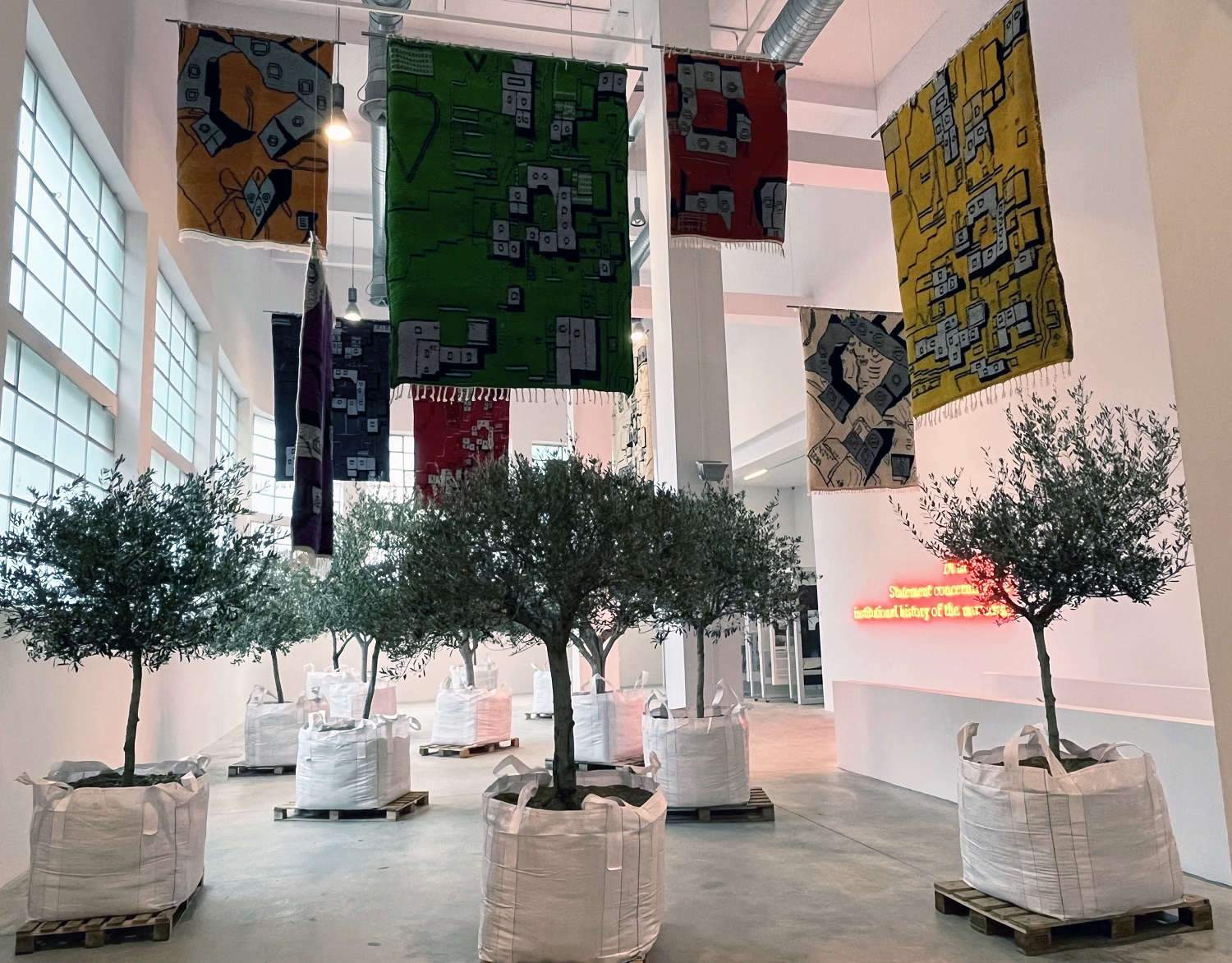In Turin, Palestinian artist Khalil Rabah brings his museum--that questions museums
In Turin , Fondazione Merz presents, from Oct. 30, 2023 to Jan. 28, 2024, the exhibition project by artist Khalil Rabah (Jerusalem, 1961) entitled Through the Palestinian Museum of Natural History and Humankind, curated by Claudia Gioia, created for the spaces of Fondazione Merz. It is a new edition of the Palestinian Museum of Natural History and Humankind, the nomadic project that Rabah inaugurated in 2003 and carried on, in continuous evolution, until today, presenting it in different places such as Istanbul, Amsterdam, London, New York, Rome, Athens and Sharjah. The Palestinian Museum of Natural History and Humankind aims to question the power of official bodies in writing history and also the exhibition methodology of museums that present their content from a one-sided perspective.
The idea is to make the museum a question and symbol of how culture can contribute to rewriting history. The Khalil Rabah museum was born out of the artistra’s connection to Palestine, but it gradually takes on a global scope, looking at very broad themes such as migration flows and cultural identities. In this sense, the museum’s own collection is composed of works that the artist modifies and integrates as testimonies in the making with respect to a reality that is instead static.
“The Palestinian Museum of Natural History and Humankind,” Claudia Gioia explains, “is a museum under construction that takes shape within the space that hosts it, where the visitor, through testimonies and clues, can experience the artist’s attempt to stitch together a narrative capable of imagining new relationships with what surrounds us. The collection is articulated by following imaginary or real floor plans, enriching itself with moving images, photographs, small sculptures, oil containers and displays in front of which to stop, to search for what history has not yet said, or has said badly and needs to be told again.”
Here, then, the museum becomes a question and a symbol of how culture can help rewrite history.
In Turin, 20 years after its inception, Khalil Rabah’s work is structured as a traversal of the entire project of the Palestinian Museum of Natural History and Humankind, in all its temporary extension and reorganization, in order to best grasp its linguistic and aesthetic provocation.
Through the Palestinian Museum of Natural History and Hum ankind opens onto an imposing structure that is deliberately unfinished and surrounded by scaffolding, designed to convey the impression that the project is either under construction or being dismantled. The walls accommodate the voids left by the cut-out human figures that animate Acampamento Vila Nova Palestina (2017), visualizing the sense of precariousness and exile that underlies the condition of refugees around the world. Serving as a counterbalance is the work 50320 Names (2006-17), a register of 50320 historic buildings in 420 villages whose owners were never officially registered due to the cadastral policies in use in the late 19th century. Fragmented geographies of the West Bank, Gaza Strip, Palestine and the Dead Sea alternate with physiognomies of animal skins in Common Geographies (2018-21), constructing an analogy between conquered territories and hunting prey presented as if they were trophies. On the ground are stacked shelves Recovered (2018), waiting to be assembled and filled with who knows what, or to be emptied. Gender and nature are the focus of the museum and, in this edition of PMNHH, the visitor embarks on a journey where art is a means of liberation from the designs of power and where olive trees, a symbol of Mediterranean culture and a recurring element of the exhibition, convey a sense of rebirth and victory over the barren desert of international politics.
The museum tour ends with the red neon Act III: Molding (2012) that reads “In this issue: Statement concerning the institutional history of the museum,” accompanied by the large searchable archive In this iusse. Act I: Painting (2011), which brings together all the museum’s activities to recount the work of weaving relationships and meanings and reaffirming the international attitude of a museum that betrays musealization as a tombstone on history and content.
Khalil Rabah bases his artistic practice on the reinterpretation of history and its interpretations. Spanning painting, sculpture and installation, the Palestinian artist questions public perception, expectations and modes of display. His works in touching on themes related to change, memory and identity, experiment with new ways of representing social communities and their relationship, inviting us to overcome the criticality of pivotal concepts such as museology and ethnography.
Born in Jerusalem in 1961, Khalil Rabah lives and works in Ramallah, is the artistic director of the Riwaq Biennial in Ramallah, founder of the Palestinian Museum of Natural History and Humankind and co-founder of the Al Ma’mal Foundation for Contemporary Art in Jerusalem. Invited to international festivals such as the 53rd Venice Biennale, the 11th Sydney Biennale, the 9th Istanbul Biennale, he has exhibitions in numerous museums to his credit and his works are in some of the most prestigious permanent collections, such as British Museum in London, Centre Pompidou in Paris, Metropolitan Museum of Art in New York and Guggenheim Abu Dhabi.
 |
| In Turin, Palestinian artist Khalil Rabah brings his museum--that questions museums |
Warning: the translation into English of the original Italian article was created using automatic tools. We undertake to review all articles, but we do not guarantee the total absence of inaccuracies in the translation due to the program. You can find the original by clicking on the ITA button. If you find any mistake,please contact us.




























